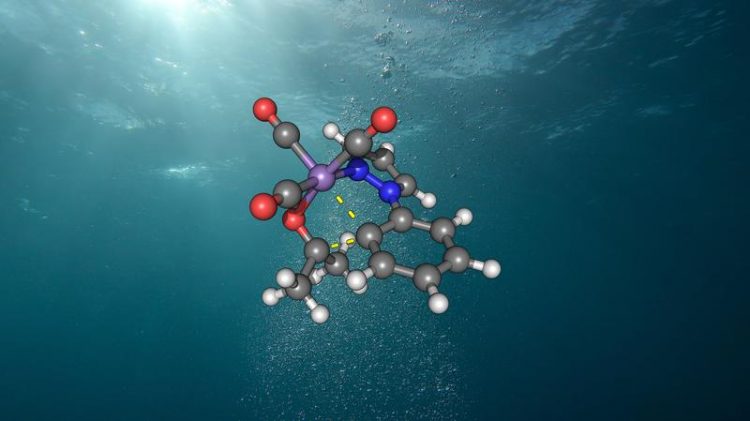The new green alternative for drug production

Structure of the active manganese catalyst in water. Photo: University of Göttingen
The environmentally friendly strategy developed by Professor Lutz Ackermann and his team at the Institute of Organic and Biomolecular Chemistry at the University of Göttingen offers major advantages over existing methods.
The naturally occurring non-toxic metal manganese is employed instead of noble transition metals such as palladium or platinum. Traditionally, organic solvents, which are highly flammable and toxic, were also used.
In contrast, the new approach makes use of environmentally-friendly water. This is possible because a manganese-carbon bond is formed in the reaction.
This bond is considerably more stable than comparable bonds between carbon and the highly reactive metals lithium or magnesium.
“The new process makes it possible to cleave a single strong carbon-carbon bond, of which organic compounds contain a large number, and convert it into the desired product,” says Ackermann.
In order to achieve the results, experimental laboratory investigations were combined with computer-aided calculations.
“This allowed us to gain detailed insight into the exact mode of action of the catalyst. And this in turn enables us to use the process to manufacture other materials.”
Professor Lutz Ackermann
Institute of Organic and Biomolecular Chemistry
University of Göttingen
Tammannstraße 2, 37077 Göttingen
Tel: +49 551 39-33201
Email: lutz.ackermann@chemie.uni-goettingen.de
Web: http://www.ackermann.chemie.uni-goettingen.de
Hui Wang, Isaac Choi, Torben Rogge, Nikolaos Kaplaneris and Lutz Ackermann, Versatile and robust C–C activation by chelation-assisted manganese catalysis. Nature Catalysis (2018). https://doi.org/10.1038/s41929-018-0187-1.
Media Contact
All latest news from the category: Life Sciences and Chemistry
Articles and reports from the Life Sciences and chemistry area deal with applied and basic research into modern biology, chemistry and human medicine.
Valuable information can be found on a range of life sciences fields including bacteriology, biochemistry, bionics, bioinformatics, biophysics, biotechnology, genetics, geobotany, human biology, marine biology, microbiology, molecular biology, cellular biology, zoology, bioinorganic chemistry, microchemistry and environmental chemistry.
Newest articles

Properties of new materials for microchips
… can now be measured well. Reseachers of Delft University of Technology demonstrated measuring performance properties of ultrathin silicon membranes. Making ever smaller and more powerful chips requires new ultrathin…

Floating solar’s potential
… to support sustainable development by addressing climate, water, and energy goals holistically. A new study published this week in Nature Energy raises the potential for floating solar photovoltaics (FPV)…

Skyrmions move at record speeds
… a step towards the computing of the future. An international research team led by scientists from the CNRS1 has discovered that the magnetic nanobubbles2 known as skyrmions can be…





















